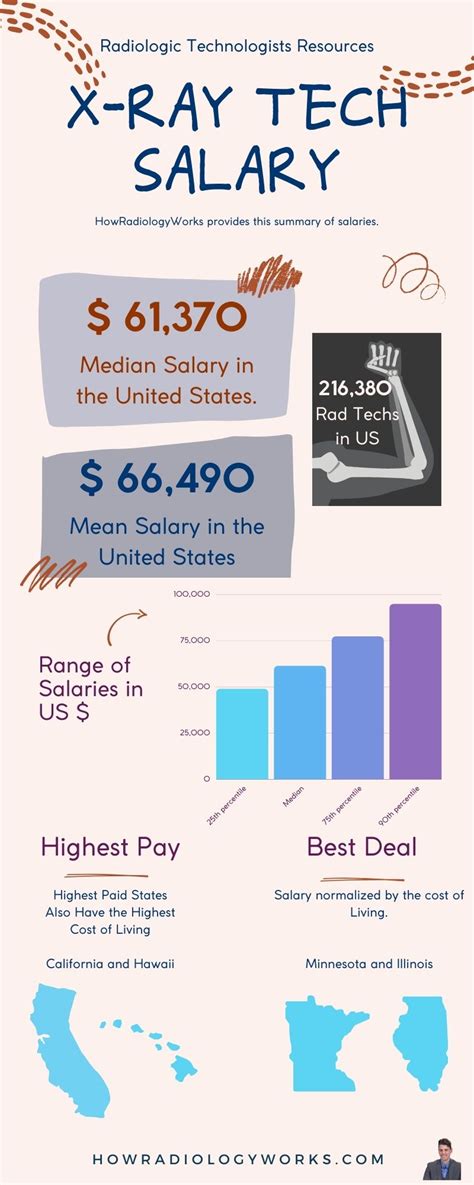Pursuing a career in radiology technology can be a rewarding and challenging profession, but it comes with various costs. From education and certification to salary expenses, it's essential to understand the financial aspects of this career path. In this article, we'll delve into the costs associated with becoming a radiology technologist, helping you make informed decisions about your future.
The Importance of Radiology Technologists
Radiology technologists play a vital role in the medical field, using imaging technologies to help diagnose and treat diseases. With the increasing demand for medical imaging services, the need for skilled radiology technologists is on the rise. According to the Bureau of Labor Statistics (BLS), employment of radiologic technologists is projected to grow 9% from 2020 to 2030, faster than the average for all occupations.
Education Costs
To become a radiology technologist, you'll need to complete a formal education program in radiologic technology. The most common programs are:
- Associate's Degree: A two-year associate's degree in radiologic technology is the most common educational pathway. Program costs vary depending on the institution, location, and whether you attend a public or private school. Here are some estimated costs:
- Community college: $2,000 - $5,000 per year (in-state)
- Private college: $10,000 - $20,000 per year
- Bachelor's Degree: Some colleges offer a four-year bachelor's degree in radiologic sciences. This program typically includes more advanced coursework and may lead to better job prospects.
- Public university: $5,000 - $10,000 per year (in-state)
- Private university: $15,000 - $30,000 per year
- Certificate Programs: Some institutions offer certificate programs in specialized areas like mammography or computed tomography (CT). These programs are usually shorter (6-12 months) and may have lower tuition fees.
Certification Costs
After completing your education, you'll need to obtain certification from the American Registry of Radiologic Technologists (ARRT). Certification costs include:
- Exam Fees: The ARRT exam fee is currently $200 for most certifications.
- Study Materials: You may need to purchase study materials, such as textbooks or online courses, to prepare for the certification exam. Costs vary depending on the materials and resources you choose.
- Continuing Education: To maintain certification, you'll need to complete continuing education (CE) requirements. CE courses may have fees ranging from $50 to $500.
Salary Expenses
Radiology technologists' salaries vary depending on factors like location, experience, and employer. According to the BLS, the median annual salary for radiologic technologists was $60,510 in May 2020. Here are some estimated salary ranges:
- Entry-Level: $45,000 - $55,000 per year
- Experienced: $60,000 - $80,000 per year
- Specialized: $80,000 - $100,000 per year (e.g., mammography or CT technologists)
Other Expenses
In addition to education, certification, and salary expenses, you may need to consider other costs, such as:
- Uniforms and Equipment: You may need to purchase uniforms and equipment, like lead aprons or radiation badges, for your job.
- Professional Memberships: Joining professional organizations, like the American Society of Radiologic Technologists (ASRT), may require membership fees.
- Liability Insurance: Some employers may require liability insurance, which can add to your expenses.

Conclusion
Becoming a radiology technologist requires a significant investment of time, money, and effort. Understanding the costs associated with education, certification, and salary expenses can help you make informed decisions about your career. While the costs may seem daunting, the rewards of a career in radiology technology can be substantial, with opportunities for professional growth, job satisfaction, and a competitive salary.
Education and Training Programs for Radiology Technologists
Radiology technologists can pursue various education and training programs to gain the necessary skills and knowledge. Here are some options:
Associate's Degree Programs
Associate's degree programs in radiologic technology are the most common educational pathway. These programs typically include:
- Classroom instruction in radiologic sciences, patient assessment, and radiographic techniques
- Clinical training in hospitals, clinics, or imaging centers
- Education in radiation safety, patient positioning, and radiographic procedures
Bachelor's Degree Programs
Bachelor's degree programs in radiologic sciences offer more advanced coursework and may lead to better job prospects. These programs typically include:
- Classroom instruction in radiologic sciences, physics, and mathematics
- Clinical training in hospitals, clinics, or imaging centers
- Education in research methods, radiologic sciences, and healthcare management
Certificate Programs
Certificate programs in specialized areas like mammography or computed tomography (CT) are designed for radiology technologists who want to gain additional skills. These programs typically include:
- Classroom instruction in specialized radiologic techniques
- Clinical training in hospitals, clinics, or imaging centers
- Education in radiation safety, patient positioning, and radiographic procedures

Gallery of Radiology Technologist Costs





FAQ Section
How much does it cost to become a radiology technologist?
+The cost of becoming a radiology technologist varies depending on the education program, certification, and location. Associate's degree programs can cost between $2,000 and $5,000 per year, while bachelor's degree programs can cost between $5,000 and $10,000 per year. Certification fees range from $200 to $500.
How long does it take to become a radiology technologist?
+Typically, it takes two years to complete an associate's degree program in radiologic technology. Bachelor's degree programs take four years to complete. Certification requires passing the ARRT exam, which can be taken after completing a formal education program.
What is the average salary for radiology technologists?
+The median annual salary for radiologic technologists was $60,510 in May 2020, according to the Bureau of Labor Statistics.
